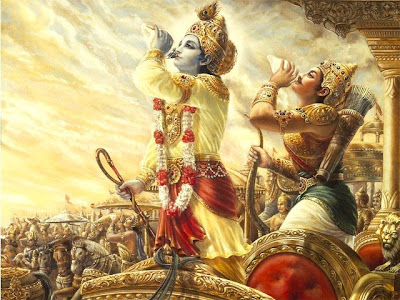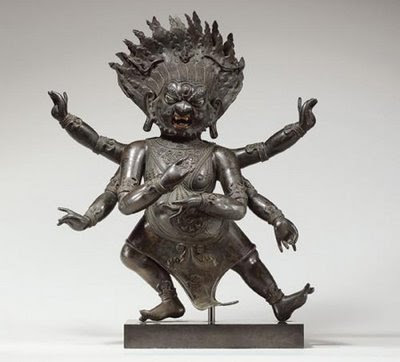This is a long (crazily?) email that I wrote to a bunch of friends. Please read and give feedback if interested!
Yoga as a form of self-empowerment (physical / physiological / mental / spiritual) is fantastic and is definitely needed for most people but I disagree with any style of Yoga where responsibility towards the society and the world at large is not center stage, especially for the privileged ones of the society. Modern day yoga gurus talk about yoga only as a form of self-empowerment. This easily leads many to disassociate themselves from the way they live their lives. They are happy to do their practice (whatever that is, non-practice inclusive) but never think of questioning and getting to the root of this world in crisis. This, I feel, is shirking of ones dharma. For the educated and the well off, spirituality will have to be centered around their responsibilities towards the world in crisis and not anyhow else. Let me explain.
Spiritual minded people never tire of saying that the world is a very connected place. I would like to elaborate. The world is a connected place not just in its well-being, but also in its ill-being. As I use electricity to type this write up out, I am responsible for many forms of violence around the world that are inextricably connected with the generation of electricity. There is lot of evidence available in the Internet for the person who is interested, hence Ill only briefly touch upon it. All ways of power generation have their share of violence - destruction of pristine forests and the lives of tribals in the case of hydroelectric power, threat of nuclear radiation leak and problems of waste storage plague nuclear energy, destruction of landscape in coal mining and serious health disorders for the miners plague coal energy. The list is endless and the point of this mail is not to list all of them. Instead, it is to point out how we are all interconnected in the ill-being of the world. Similar is the case with oil consumption. I would offer that all of us have a role to play in the continuance of many violent regimes around the world, for it is the presence of those regimes that guarantee us supply us oil and natural gas, without which neither would we have food nor medicine (food and medicine production these days are heavily dependent on petroleum energy). It may very well be argued that one can do precious little onself about these autocratic regimes. But, the point is about taking up responsibility and not about action. Right action will automatically emerge when one is reponsible. People these days do readily accept that we need to minimize our consumption of energy, as they are available in limited quantities. This may be a good enough responsibility for the average person (say a clerk in a government office) in the country, but this may not be true for most of us who are more directly responsible for driving the world in terms of its modern day lifestyles.
As engineers and managers, many of us design systems that form the center pieces of many social and economic systems. This is where things get a lot dicey. There is no one correct opinion here. Problems usually arise because people cling to one position and prefer to ram it in, which obviously is not on. Despite there being many valid positions, all positions will have valid points. In my opinion, one will be able to discover the truth for oneself only when one takes up total responsibility for the entirety of what we do. Consider the case of a terminally ill person in the family. Despite us knowing that treatment is of no use, we continuously try to do what best we can do. Despite there being many options in front of us, we continuously try to figure out the most appropriate one. All of this stems from the responsibility we take up for the situation. Similarly, if we take up responsibility for the well being of the world, responsibility for ending of violence, we will certainly cut through the differing perspectives and do the best that one may do for the well being of the world. Without this, minds of people are often only filled with ways and means to maximize oneself - whether through money, or career, or fame or something else. People also falsely interpret this as their karma or duty. I personally cannot imagine a duty that does not involve responsibility towards the world, though the form it takes for different people may vary. For someone it may be to step out of systems they perceive as violent, for another it may be to use the money they earn to set things right and for someone else it could be something else totally different (which my limited world view may not be able to imagine). Sadly, this may appear as a boring life to people as we are all trained to think responsibility is stuff to be done away with as soon as possible so that we may go and entertain ourselves. Nothing wrong in entertainment of course. But, living ones life for entertainment is like living so that one may continually taste a sweet every day. In my opinion such a life is meaningless and is a wasted life. The chance of attaining fulfillment in life would have been completely forfeited by the individual.
Coming back to our livelihoods as educated people, the money we earn is inextricably linked to companies making money on the stock market (either directly or indirectly), which primarily is run on greed. Yes, there may be a few exceptions (I would love to know them, as I dont know of any at this point), but primarily stock market is a place to make money without any responsibility (eg: bhopal gas tragedy, those who made money when Union Carbide's stock was high, have no responsibility in the disaster that ensued). Most people seldom think of these issues. I feel everyone needs to strongly consider if they really want to be part of such a system and contribute their time towards this and not merely make decision on the money they get or that they like doing their job. One needs to have a solid dharmic reason to do so (and there may be so). Even if one has one, one may have to continuously evaluate it with regards to changing situations of the world. I dont think its a good enough excuse to say I like doing it. I may love doing math, but if the only use the math I solve is to enable some military equipment manufacturer (in which case it would have been funded by such an organization), then one needs to really think about ones responsibilities towards the earth and whether one is really doing the activity to maximize well being. Our body naturally is repelled by many forms of food (as an inbuilt biological defense against consuming unwholesome foods), but we regularly masquerade all that by applying many forms of masala on the food. I feel much of the work that is done by the intelligentsia of the world today is like that - by successfully disconnecting themselves from the complete picture and being satisfied with the fact that they enjoy doing whatever that is that they are doing. Many computer scientists who worked for IBM during the second world war, may have been happy with what they were doing, but in the larger picture, the technology was being supplied to Hitler. The trained and educated folks, in my opinion, working for big corporations need to take responsibility for this (obviously, the watchman at a corporation does not have the same share of responsibility). Similar is the case with a cricketer or an actor or an ad-film maker (the challenges and questions they may have to consider will of course vary, but the spirit of it will be the same). Given that almost all engineering disciplines are strongly interconnected, its not just the mining engineer who needs to consider his responsibility towards working for a mining company which unleashes violence on tribals, the software engineer who writes sotware that runs the stock market, where this company thrives are also equally responsibile. So is the case with chartered accountant who handles the aforementioned companies accounts.

Some of the issues that we may have to consider are whether the system improves well being of people on a whole. If not, is it absolutely needed right now for we have no alternative. For eg, many organic farmers are of the view that chemical fertilizers are absolutely not needed but, many farmers having been used to chemical fertilizers may not have the skills to farm without them. So, such fertilizers may be needed at this point. Considering these and many such factors one may have to look within to discover if one has a dharmic reason to particiapte in the institution one works in. It may also be worthy to consider that ancient indian civilization, which was organized around establishing peace in the society, never went the technological route. Another factor is to see that most of the developments through modern science and technology have been motivated by corporate profits and / or military needs. I am of the opinion that things that come about with a wrong motivattion are unlikely to contribute to social peace, unless it goes through a major purifying process.
I do totally agree that its not easily possible for many people to look at the larger picture, especially when there are hungry kids at home. I totally agree with that. I completely realize that what I have presented here is objective reality as I see, plus my own subjective view points. Despite that, I would like to argue, there are lots of pros in what I say. One needs to consider them deeply, take total responsibility for the well being of all creation, look at the personal responsibilities and take an enlightened decision. This in my opinion is true spirituality, for here, the entirety of ones life reflects the fact that all life is connected. The Buddha is not regarded as the highest flowering of human consciousness, not just because he accomplished something special, but because he took responsibility for the well being of all of creation. And this, in my opinion is spiritual progress. One also needs to guard against the tendency to be a hippy and chuck all institutions because its fashionable and then abuse people within social/economic/political systems that one does not like. Changes can be brought about from within as much as from outside. But, it is possible that some institutions are so corrupt, that tearing them down may be the only option (I feel there are a few of them in todays world in whose existence many of us play an active role in). Only when one takes up total responsibility one will have the courage to see it, for many times, if ones livelihood or lives achievement is interconnected with the system, we may not have the courage to consider that option seriously.
An asana teacher, gets the student to do as much asana as he or she can do but not more. The limit is strictly observed but is constantly pushed forward. Similar is the case with responsibility. It should be taken up as per ones capability. Anything more may destroy us and is counter productive. But, within our limits, one needs to maximise what one can. Responsibility lies in the heart and that in no way depends on external reality. The external action one may take does, of course, and that is for each individual to decide for himself / herself. Again, the example of a terminally ill dear one is a good analogy. What we may do actually, depends on very many factors, but in our heart, because of the total responsibility we have taken, we go the full distance. This development of the heart is spirituality and this is what seems to be the shortest route to spiritual evolution and this is what I refer to as Yoga via Responsibility.
The yoga of responsibility naturally pulls in all other forms of yoga. It has no differences with any other form of yoga or any form of spirituality or science. It is happy to incorporate all of them so as to take ones life on more responsible paths. When one is established in responsibility, one quickly realizes ones lack of spiritual maturity and realizes that it has been the single biggest collective disease of humanity, thereby developing the wisdom (gnana) / devotion (bhakthi) / right action (karma) / personal empowerment (raja) to take up more and more responsibility. This may not be a new concept and may have been elucidated by many past spiritual masters. I am simply trying to contextualize this, as I see it, to the 21st century educated person. Fifty years ago in India, one may have needed to evaluate ones participation in the social system of caste and today it is something different, depending on where one lives in India.
Environmental degradation of every aspect of the biosphere, food systems being poisoned with chemicals of every kind, educational system being used to produce people who can only think and that too without their hearts, corporations working ruthlessly to make money without any scruples, people dividing each other based on so many categories and many other issues plague our world. Some of these systems have their uses too, of course. I would like to reiterate here that this write up is not debate for or against organic food, or for or against modern ideas of growth and development though I may have touched upon these subjects. The point is to raise awareness about these issues and request the reader to take up responsibility for many of these issues that are so pertient to our lives and figure out how one is going to respond to them skillfully. This very process of sincere responsibility for the well being of the world will naturally lead to one spiritual evolution. In fact, for a person who is totally established in that state, even ones own spiritual evolution would not matter so much! Only responsibility for the world will remain. This in my opinion is (or at least is close to) the exalted state of consciousness, which the incomparable Patanjali, refers to as dharma mega samadhi!





